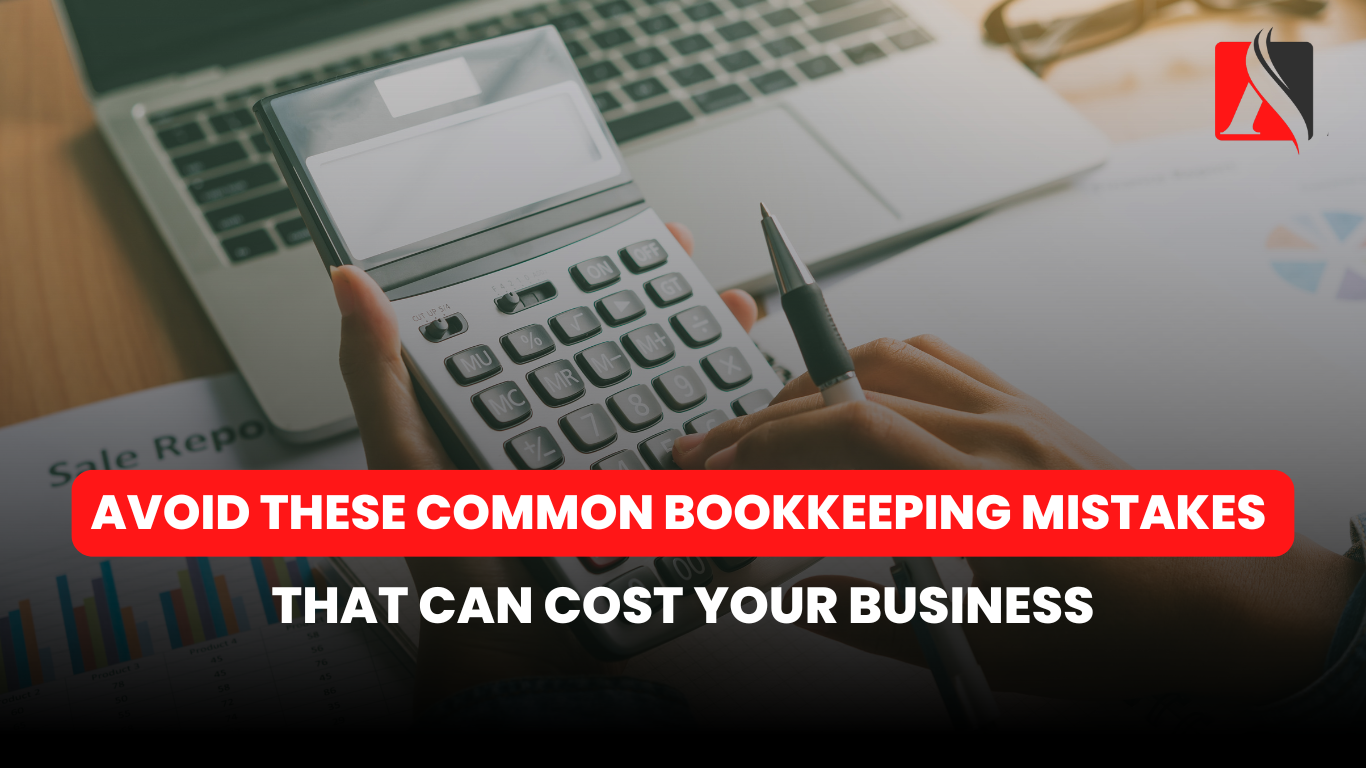Running a business is just as thrilling as it is daunting, especially for those who begin at the inception of a new venture. Small business owners, for example, often engage in multiple roles-inside-the-box-that include developing their products, doing the marketing, and looking for bookkeeping tips. This is one reason why, while important, bookkeeping is so often neglected. It’s understandable that so many entrepreneurs leave the task of bookkeeping in the hands of others or consider it an administratively mundane task that doesn’t seem to contribute directly to the bottom line. This is because poor bookkeeping can become expensive with errors that will badly affect your business’s financial health. It’s therefore important for any starter or small businesses to understand common bookkeeping mistakes and how they affect a business.

1. Not Separating Personal and Business Expenses
The most common mistakes done by the new business owner in bookkeeping is unmarked personal and business expenditure, especially in using one bank account for all kinds of personal and business transactions, which often leads to confusion and complicates tax time.
Why It’s a Problem:
- This will make tracking of business expenses harder, which will reflect in your financial reports and tax deductions.
- In fact, you risk missing some nice tax write-offs due to a demand by the IRS to keep clear records of business transactions.
Solution:
Create another checking account, and a savings account, preferably in the first week of opening your business. It will be easier to account for expenses if you have a credit card specifically for your business, and the records will not become cluttered. Most banks offer very low-fees for small business checking accounts or even no fees at all. Separate accounts will make it easier to manage the finances and will help prepare taxes better.
2. Neglecting to Track Small Expenses
Such tiny expenses at times become minute on a daily basis, but can add up shortly. They will range from seeing a client over coffee to pen and paper. Some of the costs often go unrecorded. This usually means that, in your bookkeeping, your accountant or auditors could sometimes raise errors in the accounts at some point.
Why It’s a Problem:
- Over time, these insignificant amounts might accumulate and cause discrepancies in your financial records.
- You may end up missing some deductions, which can impact your profit margins and tax obligations.
Solution:
Begin to track each expense, no matter how minor they may be. There are many tools and apps out there that can help you track expenses easily, such as Expensify or QuickBooks. It also automatically generates reports or reminders for tracking these inconsequential costs that one must ensure get into their bookkeeping system.
3. Failure in Regular Accounts Reconciliation
Account reconciliation compares your bookkeeping records and your bank statements, that is, comparing your bookkeeping records with your bank statements to ensure they match. The sad truth is most small business owners neglect this, or when they are doing so, they’re either not doing it often enough, which can lead to far more complicated financial problems later on.
Why It’s a Problem:
Failure to reconcile accounts may make you overlook a missed payment, overdrafts, or fraudulent activity.
Miscalculated financial statements may lead to poor business decisions and even result in wrong tax filings.
Solution:
Reconcile every month or bi-weekly. Automatically reconcile the account using accounting software that matches the transactions on your books against those on your bank account. This enables an individual to quickly spot errors, maintain accurate records, and thus avoid nasty surprises with filing taxes or reviews of the financial books.
4. Misclassifying Expenses
Another common bookkeeping mistake is the wrong classification of expense items. You would expense capital expenditures as operational expenses and vice versa: treating the purchase of a new computer as an operational expense and office supplies as a monthly operational expense. On the surface, it may not be an issue, but wrong classifications impact the income you declare for tax purposes and financial reporting.
Why It’s a Problem:
- Mistaken classification of your expenses will change your financial outlook or lead you astray regarding your actual profits.
- It can lead to inaccurate tax returns, which might bring undue attention from the IRS.
Solution:
Identify and monitor various cost heads that you incur – operating costs, capital outlays, payroll, etc., and monitor against the right ones. If unsure, an excellent accountant or accounting software that guides on classification will ensure that your books are accurate and transparent.
5. Non-Tracking of Receipts
Then there are those who simply throw receipts away and those who assume since the transaction will show up in their bank records, they do not have to keep the actual receipt. Without those receipts, though, your business may be in for a rough ride when an audit rolls around or at tax time when you are trying to verify specific deductions.
Why It’s a Problem:
- Lack of receipts can’t explain away the spending when audit time comes.
- Missed out on deductions that will be bitten off from the bottom line
Solution:
Make a habit out of keeping all your business-related receipts. If you prefer to go digital over paper, then you have to use an app about receipt management such as Shoeboxed or QuickBooks. These applications enable you to take pictures of your receipts and turn them into digital organization, making it easier for you to find at any given time.
6. Doing Everything Manually
Attempting to do everything without the use of more modern accounting software is a huge mistake that can keep you stuck in time-consuming tasks, errors, and inefficiencies. As much as you can use manual bookkeeping to get by in the short run, growing a business makes this unmanageable and prone to errors.
Why It’s a Problem:
Manual bookkeeping increases the risk of data entry errors and missed transactions.
It eats into valuable time you could spend trying to grow your business.
Solution:
Invest in quality accounting software that automates bookkeeping. Xero, QuickBooks, and FreshBooks are some of the most successful tools utilized to streamline processes and minimize errors, giving you direct access to real-time financial information. Automation ensures precision, consistency, and efficiency in the management of books.
7. Inconsistent Bookkeeping Practices
Most small business owners close their books only when they know that tax time is close or realize that they need a loan or investment. This inconsistency of bookkeeping leads to poor management of finance, cash flow, and even penalties from late filing.
Why It’s a Problem:
- When you allow irregular bookkeeping, you are left with old information concerning your financial affairs that prevent you from making the right decisions for your business.
- Delayed tax filings or missed payments due to inconsistent records can attract penalties and tarnish your business reputation.
Solution:
Record-keeping as a habit of doing business. Set aside time every week or month to update the record. Otherwise, hire an account to perform the book-keeping for you. That way, you’ll ensure your books are always up-to-date without making mistakes or missing important deadlines.
8. Failure to Hire a Professional
Most startups think that they can handle bookkeeping in-house or, rather, entrust it to someone with limited experience. As a result, there is often a common error that expends the business’s time and money, or even worse, law.
Problem
Lack of expertise in handling bookkeeping increases the possibility of errors that lead to making mistakes and losing opportunities for taxes. Moreover, it will capture your attention from other crucial aspects of your business.
Solution:
You could opt to hire a professional bookkeeping service. A professional will ensure that your books are up to date, accurate, and tax compliant. This allows you to shift the focus back to business growth knowing well that your finances are in order.
Conclusion
Bookkeeping for small businesses and startups is terribly overwhelming, but avoiding common bookkeeping mistakes will keep your financial life healthy and ensure success in the long term. Even what seems like tiny slips down the road quickly snowball into serious problems-including cash flow and even IRS penalties. So to avoid costly mistakes, you’ll want to use accounting software, keep receipts, classify expenses correctly, and stay on top of your books regularly.

No doubt, the best decision you can make when you’re at the stage where you need to clean up your bookkeeping and focus more on growing the business is working with a professional accounting service. Aced Accounting specializes in helping small businesses stay on top of their finances through expert bookkeeping services that are tailored to meet your unique needs. Whether you are a start-up or growing business, we can help you determine how not to make expensive bookkeeping mistakes and keep your financial records intact. Feel free to contact us today, and find out how we can help your business reach its highest potential profit level.








